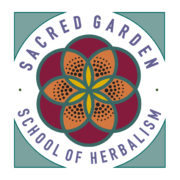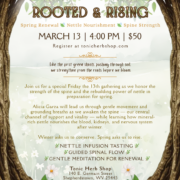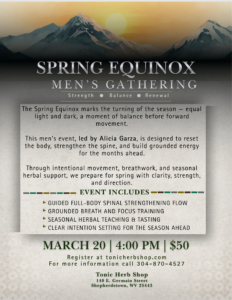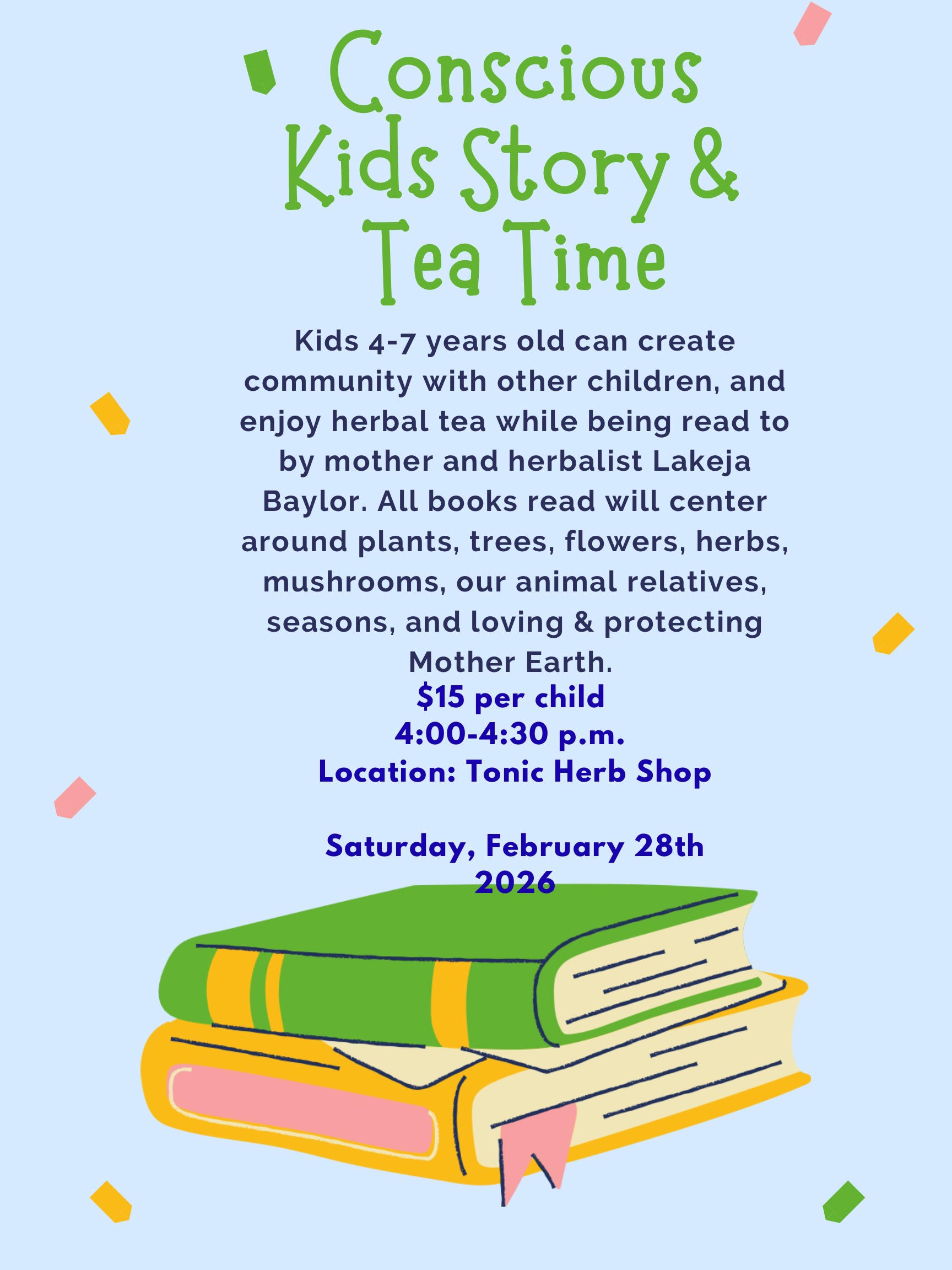UPCOMING EVENTS
Spring Detox Webinar

Sunday March 8th
1:30-3:00 pm
Join Ashley Davis for a FREE webinar this Sunday!
We will explore the tradition of spring cleaning from an Ayurvedic lens and meet the local plants that are available this season to support natural detoxification.
Foundational Herbology
9 month program is now enrolling!

Registration closes March 15th
+++++++++++++
Authentici-Tea Conscious Conversation Circles
Every Thursday @ 7pm
starting March 5th

Grounded Sound Baths
with Terrie Weaver

Fridays March 6th & 20th
6:45 pm
(with optional Cacao Ceremony beforehand at 6:00)
+++++++++++++
Women’s Herbal Wellness Class Series
with Alicia Garza

March 13th @ 4pm
Theme: Rooted & Rising
Spring Renewal | Nettle Nourishment | Spine Strength
+++++++++++++
Spring Equinox Men’s Gathering

March 20th @ 4:00 pm
Join Alicia Garza for a day of balance, incorporating intentional movement, breath work, seasonal herbal support and guided meditation to strengthen the spine, and prepare for spring with clarity, strength & direction.
+++++++++++++
Conscious Kids Story & Tea Time
with Lakeja Baylor

3-Day Immersion: Reading the Body Immersion
with Margi Flint

October 23rd-25th : 10am-4pm






Elecampane
/in Herb of the Month /by Ashley DavisBotanical Name: Inula helenium
Other Names: Elf Dock, Scabwort, Elf wort, Yellow Starwort
Part Used: Root
Taste: Bitter, Pungent, Acrid
Energetics: Warming, Moving, Drying
Actions: expectorant, antimicrobial, digestive bitter,
Uses: Elecampane decongests stagnant fluids in the body. It is one of the strongest antibacterial herbs that we have (according to herbalist Matthew Wood, even diluted elecampane (1 to 10,000) will kill bacteria, especially tuberculosis). Elecampane has a strong affinity for the respiratory tract and most herbalists think of it as a respiratory herb for bronchial infections including bronchitis, tuberculosis, and pneumonia. It is indicated whenever there is heavy, thick, green or yellow mucus (a sign of bacterial infection) as well as a non-productive or persistent cough. Elecampane will promote expectoration from the deepest layers of the lungs, when the cough is not strong enough to bring up the mucus.
Elecampane is also used to help heal wounds that will not scab (“proud flesh”). It is being studied for its ability to kill MRSA (especially hospital acquired respiratory infections (Katja Swift).
As a warming bitter, elecampane also warms the fires of digestion, breaks up mucus in the digestive tract, and stimulates digestive secretion. It can clear overly damp conditions of the intestines and support absprption of nutrients by improving lymphatic flow around the intestinal tract. It can also balance the microbiome of the gut by killing unehalthy bacteria, and by supporting beneficial bacterial through its high content of inulin. Inulin is a starch that provides food for probiotics. Inulin composes up to 45% of the root of elecampane, which is why the plant is named Inula helenium.
A lesser known virtue of elecampane is its effect on the heart. It is considered a heart remedy in the Ayurvedic tradition. Matthew Wood writes about elecampane being a remedy for heartache (specifically heartache due to being “torn away from one’s home”). He also writes about a client who used elecampane for a respiratory infection and had the pleasant side effect of healing her ventricular fibrillation. She had a dream about mucus being cleared from her heart area. I don’t have much evidence to support elecampane being used as a heart remedy, but from a holistic perspective, I can see how elecampane could indirectly strengthen and support the heart by helping to clear the channels of elimination. In Traditional Chinese Medicine, the bitter flavor is said to nourish the heart/fire element. And the pungent/spicy flavor is said to increase the fire element. The combination of bitter and pungent tastes present in elecampane do support the claim as herb that can help strengthen the heart.
Folklore: You might be wondering what elecampane has to do with elves…well, some say that this plant was used to treat “elfshot,” which is a condition of wasting and preoccupation supposedly caused from being shot by an elf’s arrow. Elecampane also helps us to connect with the world of the elves. Elves are said to live under the plant. And anyone who has experience communing with devas, faeries, angels and other beings beyond the veil knows that such communion begins from the heart. We must be present from a heart-centered place (as opposed to a mental place). The heart is the middle chakra, the mid-point between our root and our crown. When we have emotional/energetic blockages around our hearts, the flow of divine source energy cannot flow freely through our central channel it is difficult for us to receive guidance from the heavens. And one look at the elecampane plant in full form, from is thick taproot to its tall radiant flower at its crown, suggests that it is a channel between heaven and earth. I would venture a guess that as elecampane can clear stagnation and open the channels of the physical body, so can it clear stagnation/blockages from the emotional and spiritual bodies, opening us to the mysteries beyond the veil, including elves & feaires. (Precaution: communing beyond the veil does require safety measures & discernment. Please do not attempt to do this on your own without guidance from someone experienced in these realms).
The species name helenium comes from the Greek legend of Helen of Troy who was abducted from her homeland of Sparta and taken to Troy. In the places where her tears hit the earth, elecampane is said to have sprouted. Based on this, elecampane is used in energetic preparations to treat heartache and grief due to being torn from one’s home.
Specific Indications: weak appetite, poor assimilation, swollen tongue (indicating a cold & damp digestive environment), wounds that do not form a scab, acute bronchitis, respiratory infections, chronic postnasal drip, yellow to green mucus.
Cautions: Not recommended during pregnancy or lactation
References: The Earthwise Herbal by Matthew Wood (Old World)
*This information is for eductional purposes only. It is not meant to diagnose, treat, or cure any disease.